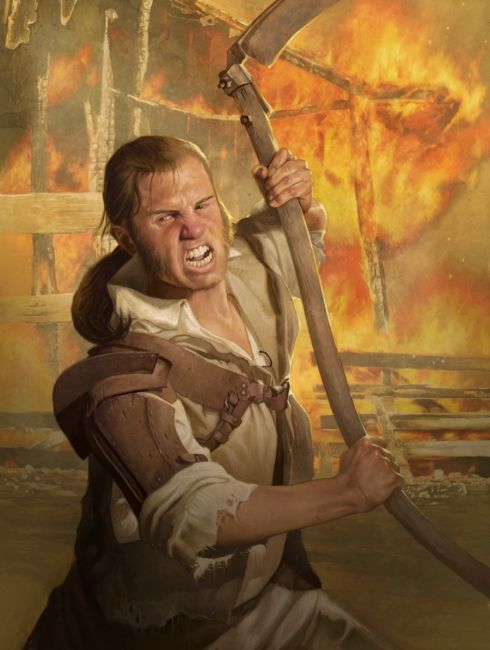Difference between revisions of "Comrade (non-player character)"
Tao alexis (talk | contribs) |
Tao alexis (talk | contribs) |
||
| (2 intermediate revisions by the same user not shown) | |||
| Line 10: | Line 10: | ||
Comrades possess [[Hit Points|hit points]] according to their [[Hit Points per Die|body mass]], +1. Their [[Negative Hit Points|negative hit points]] are much reduced from that of levelled persons, such that they will die if [[Damage (hit points)|damage]] reduces them to below -3 hit points. | Comrades possess [[Hit Points|hit points]] according to their [[Hit Points per Die|body mass]], +1. Their [[Negative Hit Points|negative hit points]] are much reduced from that of levelled persons, such that they will die if [[Damage (hit points)|damage]] reduces them to below -3 hit points. | ||
| − | In combat, they're serviceable in large numbers. They have a [[THAC0]] of 21. They possess one [[Weapon Proficiencies|weapon proficiency]] in [[Club (weapon)|club]], though they can use | + | In combat, they're serviceable in large numbers. They have a [[THAC0]] of 21. They possess one [[Weapon Proficiencies|weapon proficiency]] in [[Club (weapon)|club]], though they can use the region's [[Hereditary Weapon I (sage ability)|hereditary weapon]] with a penalty of -1 [[Roll to Hit|to hit]]. Their non-proficiency penalty with all other weapons is -5. |
They are trained to fight with shield and in padded armour, and can make use of a helmet. | They are trained to fight with shield and in padded armour, and can make use of a helmet. | ||
| Line 18: | Line 18: | ||
== Experience == | == Experience == | ||
| − | Comrades can gain [[Experience (X.P.)|experience]] (they receive one-fourth share of the x.p. bonus after combat). If they accumulate as many as 600 points (including those they may have gained as a commoner), they may be considered equal to a [[Soldier-at-Arms|soldier-at-arms]], regardless of [[Train Soldier-at-Arms (sage ability)|training]]. They cannot advance beyond this training to become levelled persons without [[Level Training (sage ability)|special training]]. | + | Comrades can gain [[Experience (X.P.)|experience]] (they receive one-fourth share of the x.p. bonus after combat). If they accumulate as many as 600 points (including those they may have gained as a commoner), they may be considered equal to a [[Soldier-at-Arms (profession)|soldier-at-arms]], regardless of [[Train Soldier-at-Arms (sage ability)|training]]. They cannot advance beyond this training to become levelled persons without [[Level Training (sage ability)|special training]]. |
| − | However, any comrade with sufficiently high stats, the financial means, a tutor and sufficient time may become a character class. This is rare for an adult, and requires many years; it's far more likely for a | + | However, any comrade with sufficiently high stats, the financial means, a tutor and sufficient time may become a character class. This is rare for an adult, and requires many years; it's far more likely for a comrade to propose one of their children for the privilege (who, still in the flower of youth, roll 3d6 for their ability stats). |
See [[The Adventure]] | See [[The Adventure]] | ||
Latest revision as of 23:44, 13 August 2023
Comrades are non-levelled combatants that have received a small amount of combat training, so that they are more threatening than commoners. They do not need to make a morale check in order to enter battle. They possess standard morale.
Though still of the social status of commoner, comrades can be viewed as a peasant-turned-soldier, in that they're mentally prepared for the mental challenge that would provide. Some have actually witnessed the noise, chaos and brutality of warfare, and have trekked to distant parts in order to take their place on the battlefield. As such, their perception of outsiders, and their understanding of their place in the world, is very different from that of a serf.
As Hirelings
Nearly all will possess an amateur or authority-status in some kind of sage ability, most commonly farming, foraging, sailing, fishing, woodcutting, herding and the like. Hirelings that are artisans or heavy labourers are nearly always comrades.
As Combatants
Comrades possess hit points according to their body mass, +1. Their negative hit points are much reduced from that of levelled persons, such that they will die if damage reduces them to below -3 hit points.
In combat, they're serviceable in large numbers. They have a THAC0 of 21. They possess one weapon proficiency in club, though they can use the region's hereditary weapon with a penalty of -1 to hit. Their non-proficiency penalty with all other weapons is -5.
They are trained to fight with shield and in padded armour, and can make use of a helmet.
Ability Stats
A comrade's stats are generally less than those of better educated artisans, scribes, educators, artists and so on, largely because the individual's dreadfully hard life has wrought damage on his or her health over many years. When rolling the ability stats for a commoner, use 2d6+1d4. Add 1 point to both strength and constitution, to a maximum of 18. See experience, below.
Experience
Comrades can gain experience (they receive one-fourth share of the x.p. bonus after combat). If they accumulate as many as 600 points (including those they may have gained as a commoner), they may be considered equal to a soldier-at-arms, regardless of training. They cannot advance beyond this training to become levelled persons without special training.
However, any comrade with sufficiently high stats, the financial means, a tutor and sufficient time may become a character class. This is rare for an adult, and requires many years; it's far more likely for a comrade to propose one of their children for the privilege (who, still in the flower of youth, roll 3d6 for their ability stats).
See The Adventure
